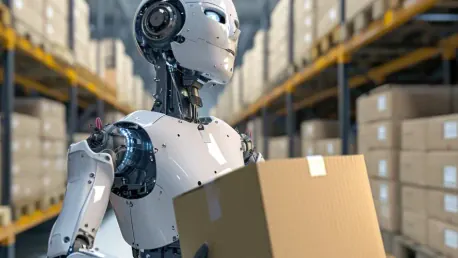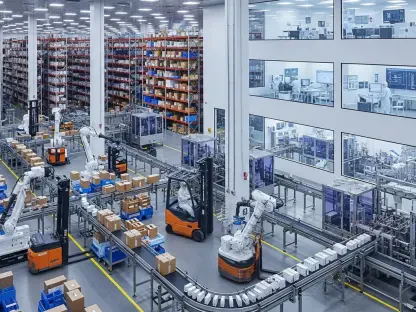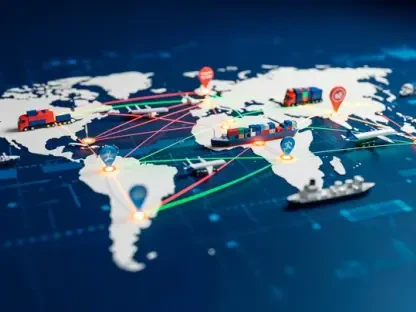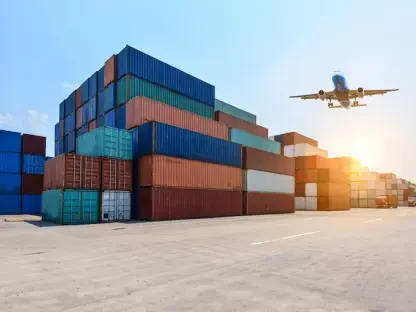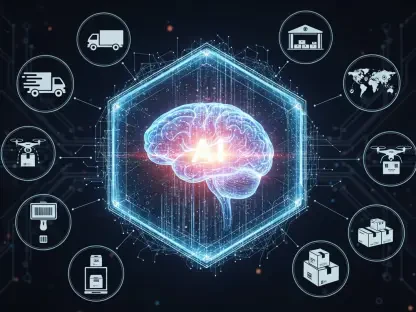The logistics industry is on the cusp of a significant transformation, driven by the powerful capabilities of artificial intelligence (AI) and machine learning. In 2025, these technologies are set to revolutionize various facets of logistics operations, from optimizing supply chains to preventing fraud. This article delves into how AI is enhancing efficiency and combating fraud in the logistics sector, offering a glimpse into the future of automated logistics.
Transforming Supply Chain Visibility
Real-Time Data Analysis
AI is providing logistics companies with unprecedented end-to-end supply chain visibility. By analyzing both structured and unstructured data in real-time, AI tools are helping companies manage supplier relationships more effectively. This enhanced visibility allows for proactive risk management and improved decision-making throughout the supply chain.
The complexity of global supply chains necessitates comprehensive, real-time monitoring to ensure efficient operations. AI-based tools facilitate this by enabling logistics companies to analyze vast volumes of data at unparalleled speeds. This allows for early detection of potential disruptions, enabling companies to mitigate risks before they escalate into significant issues.
Real-time data analysis supported by AI disrupts traditional methodologies where manual tracking and delayed reporting were prevalent. The AI-driven solutions help logistics managers to anticipate potential delays and plan alternative routes proactively. Furthermore, these technologies bridge communication gaps between different tiers of suppliers, ensuring seamless information flow across the supply chain network.
Compliance and ESG Monitoring
Automation technologies are also streamlining compliance tasks. AI-driven tools, such as those developed by Semantic Visions, use natural language processing to map out intricate supplier relationships and monitor environmental, social, and governance (ESG) performance. This ensures that companies can stay ahead of regulatory demands and maintain high standards across their supplier networks.
Staying compliant with evolving regulations is a substantial challenge for logistics companies, given the complexity of international trade laws and environmental standards. AI aids in simplifying this process by continuously scanning through regulatory updates and ensuring that all operational activities adhere to mandated guidelines. This automated compliance checking saves time and minimizes the risk of human error.
Moreover, the focus on ESG performance has grown significantly, with stakeholders demanding transparency regarding environmental and social impacts. AI tools are capable of assessing ESG metrics comprehensively, allowing companies to monitor if their suppliers comply with required standards. This ensures accountability across the supply chain, building trust with consumers and partners while promoting sustainable practices.
Combating Fraud with AI
Predictive Analytics
Fraud in logistics has evolved in complexity, but AI is rising to the challenge. Predictive analytics powered by AI allows for real-time monitoring of operations, identifying anomalies and suspicious patterns that may indicate fraudulent activities. This enables logistics providers to respond swiftly and effectively to potential threats.
AI’s capability to process massive datasets in real-time is particularly advantageous in identifying fraud, as it can discern patterns and anomalies that would be impossible for humans to catch. Real-time monitoring facilitated by AI means that potential fraudulent activities are detected almost instantly, allowing companies to act quickly and mitigate risks. Predictive analytics empower logistics providers to forecast fraudulent attempts and enforce preventive measures before any significant damage occurs.
Traditional methods of fraud detection often rely on historical data analysis, which can be outpaced by the rapid evolution of fraud tactics. AI’s predictive analytics offer a dynamic solution by continuously learning from emerging fraud patterns and adapting its algorithms accordingly. This adaptability ensures that companies remain one step ahead of fraudsters, safeguarding their operations against ever-evolving threats.
Industry Collaboration
AI tools are fostering industry-wide collaboration by facilitating data sharing among logistics providers. This collective effort helps identify emerging fraud trends and develop preemptive strategies. Startups like GenLogs are using AI to detect fraud in real-time and dismantle criminal networks, showcasing the innovative approaches being adopted in the industry.
Collaboration among industry players significantly enhances the detection and prevention of fraud. By sharing data through AI-powered platforms, logistics companies can collectively monitor potential fraud patterns. This collective intelligence approach amplifies the ability to recognize and respond to fraud attempts that may not be apparent when analyzing an isolated dataset. Industry-wide collaboration leverages shared knowledge and enables the development of more robust anti-fraud strategies.
Innovative startups like GenLogs exemplify the cutting-edge applications of AI in combating fraud. Their use of computer vision and predictive analytics to monitor logistics operations in real-time allows for swift identification and response to fraudulent activities. This innovative approach ensures that potential fraud is addressed before it can significantly impact the logistics network, showcasing how AI is empowering the industry to stay ahead of criminal schemes.
Optimizing Electric Vehicle Fleets
Route Planning and Charging Management
The shift to electric vehicle (EV) fleets is essential for reducing the environmental impact of logistics. AI-driven technologies are crucial in managing the complexities of EV fleets, such as planning efficient routes and charging stops. These tools ensure that electric trucks are utilized effectively, minimizing downtime and maximizing productivity.
Transitioning to EV fleets necessitates meticulous planning, particularly when it comes to route optimization and charging station management. AI technologies play a pivotal role in this context by analyzing vast amounts of data related to vehicle range, traffic conditions, and charging infrastructure availability. This allows logistics companies to plan the most efficient routes, ensuring timely deliveries while optimizing battery usage.
In addition to route planning, AI assists in managing charging schedules to minimize downtime and maximize operational efficiency. AI-driven tools optimize the timing and location of charging stops, ensuring that vehicles are charged during off-peak hours and at locations that align with their routes. This reduces the time spent idly at charging stations, enhancing overall fleet productivity.
Economic Viability
Integrating EVs into logistics operations requires sophisticated technology to ensure economic viability. Companies like Nevoya are building models optimized for EV requirements, leveraging AI to manage higher vehicle costs and optimize trailer utilization. Government incentives and decreasing EV costs further support the transition to sustainable transportation.
Building an economically viable EV fleet involves addressing numerous challenges, including higher upfront costs and operational complexity compared to traditional diesel vehicles. AI-driven solutions help mitigate these challenges by optimizing the utilization of EVs, ensuring that each vehicle is used to its full potential. This involves sophisticated algorithms that analyze various factors, such as load capacity and route efficiency, to maximize the return on investment.
Government incentives and subsidies play a vital role in offsetting the initial cost barriers associated with transitioning to EVs. As the cost of EV technology continues to decline, AI-driven models ensure that logistics companies can capitalize on these incentives efficiently. AI tools also help in calculating the total cost of ownership, factoring in savings from reduced fuel consumption and maintenance, thereby making a compelling business case for EV adoption.
Streamlining Non-revenue Tasks
Automating Routine Processes
Non-revenue tasks, such as retrieving proof of delivery or verifying rates, can consume valuable time and resources. AI and automation technologies are transforming these processes, allowing logistics providers to focus on high-value activities. Platforms like CloneOps.ai use virtual agents to automate routine tasks, enhancing operational efficiency and improving client relationships.
Routine administrative tasks often pose significant burdens on logistics companies, diverting resources away from core business operations. AI-powered automation tools, such as virtual agents, streamline these tasks by handling them efficiently and accurately. This automation not only reduces the workload on personnel but also minimizes the risk of errors associated with manual processing.
Platforms like CloneOps.ai exemplify the potential of AI in automating routine processes. Virtual agents on these platforms can retrieve proof of delivery documents, verify rates, and handle other administrative tasks with minimal human intervention. This frees up logistics staff to focus on higher-value activities, such as strategic planning and relationship management, thereby enhancing overall operational efficiency.
Enhancing Efficiency
The logistics industry is on the verge of a major transformation due to the influential capabilities of artificial intelligence (AI) and machine learning. By 2025, these cutting-edge technologies are expected to revolutionize numerous aspects of logistics operations, from optimizing supply chains to preventing fraud. This shift is anticipated to bring significant enhancements in efficiency and security within the sector.
AI will streamline supply chains by predicting demand more accurately, managing inventory levels, and improving route planning. This increased precision will lead to cost savings and faster delivery times. Additionally, AI’s ability to analyze vast amounts of data in real-time will help logistics companies respond promptly to market changes and unexpected disruptions, ensuring smoother operations.
Machine learning algorithms will play a pivotal role in identifying fraudulent activities, such as cargo theft and deceptive transactions. By swiftly detecting patterns that indicate fraud, these technologies will enable companies to take preemptive measures, safeguarding both assets and customer trust.
Overall, the integration of AI and machine learning is set to redefine logistics, making it more efficient and secure. This article provides a glimpse into the future of automated logistics, highlighting the transformative impact these technologies will have on the industry in 2025.
